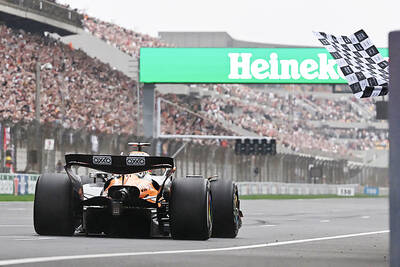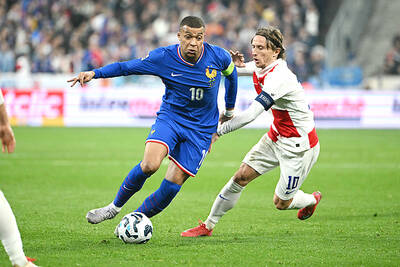Fiji battled from behind to beat Asian champions Japan 24-12 yesterday to chalk up their second win after three matches in the Pacific Nations Cup.
Fiji, who narrowly lost to New Zealand Maori 11-7 at home a week ago, trailed Japan 9-3 at halftime, but scored three converted tries in the second half in driving rain at the National Stadium.
“We always knew it was going to be tough playing Japan in Japan,” Fiji coach Ilivasi Tabua said. “It was not until the final 15 minutes that the game changed.”
Disappointed Japan coach and All Blacks legend John Kirwan said: “We had ample opportunity to win today, but threw the game away with errors.”
Japan’s starting 15, unchanged from the side that beat Tonga 35-13 last week, opened the scoring against a disorganized Fiji in the fifth minute with a penalty goal by James Arlidge.
Taniela Rawaqa leveled the scores with a penalty six minutes later, but the Brave Blossoms went ahead with two more penalty goals by Arlidge, who missed a third attempt a minute before the break.
“We told the boys at halftime to play in their territory and make Japan make mistakes and score from them and we did,” Tabua said.
Fiji started to click in the second half, with Sireli Naqelevuki making the most of a handling error by Japan fullback Shaun Webb to run in their first try in the 50th minute, with two more coming through Rawaqa and Vereniki Goneva.
Arlidge restored Japan’s lead in the 54th minute with his fourth penalty, taking the score to 12-10.
But it was his error that led to Fiji’s second try two minutes later when he scuffed his kick so badly it hit one of his teammates and from the resulting scrum, Rawaqa crossed the line.
Goneva touched down with two minutes to go, with Rawaqa scoring his third conversion.
It was the eighth win for Fiji over Japan in their 10 meetings.
In their previous encounter, Fiji struggled past the Blossoms 35-31 in Toulouse, in what was regarded by many as one of the best games of last year’s Rugby World Cup.
Japan will face New Zealand Maori in Napier next weekend in their first match on the road.
Fiji face tournament leaders Australia A away in Brisbane.

The US’ bid for a fourth consecutive CONCACAF Nations League title came to a stunning end as they fell 1-0 to Panama after a stoppage-time goal from Cecilio Waterman on Thursday in Inglewood, California. Despite dominating possession, the US struggled to break down a resilient Panama side for long periods. Panama spent the bulk of the match defending, but pounced on a giveaway by the US before substitute forward Waterman sent a shot from the right side of the area to the bottom left corner late in stoppage time. Up next for Panama in tomorrow’s final is to be Mexico, who beat

DOMINATION: McLaren drivers Oscar Piastri and Lando Norris took the first two spots as Mercedes’ George Russell and Red Bull’s Max Verstappen followed them Australian Oscar Piastri yesterday roared back from season-opening disappointment in his home race by winning the Formula One Chinese Grand Prix from pole position in a McLaren one-two with championship-leading teammate Lando Norris. George Russell finished third for Mercedes, ahead of Red Bull’s reigning champion Max Verstappen with Ferrari’s Charles Leclerc and Saturday’s sprint winner Lewis Hamilton fifth and sixth respectively. Piastri’s win denied Norris a third victory in a row, including last year’s Abu Dhabi season-ender, but left champions McLaren unbeaten in two races so far this year. “Mega job guys. The car was very, very lovely,” Piastri said

TO FINAL FOUR: France had 22 chances and scored two goals, while Croatia could not manage a single shot on target in 120 minutes. Les Bleus won 5-4 on penalties France on Sunday overturned a two-goal deficit to qualify for the UEFA Nations League Final Four by eliminating Croatia 5-4 on penalties after a 2-0 victory in their quarter-final second leg at the Stade de France. Dayot Upamecano scored the winning spot kick in a nail-biting shootout in which France keeper Mike Maignan made two saves, sending Les Bleus into the semi-finals against Spain. Michael Olise opened the scoring and Ousmane Dembele doubled their lead 10 minutes from time to send the tie into extra time after their 2-0 loss in Split, Croatia, on Thursday. France had a total of

Armand Duplantis will be among the reigning Olympic champions adding star power to the world indoor championships this weekend when the Chinese city of Nanjing hosts the first major global athletics meet since the Paris Games last year. The three-day event was originally slated for 2020 and faced multiple postponements due to the COVID-19 pandemic, but Nanjing’s Sports Training Center would finally welcome more than 570 athletes for the start of the showpiece today. One of the main attractions would be pole vaulter “Mondo” Duplantis, who soared 6.27m to break the world record for a staggering 11th time in Clermont-Ferrand last